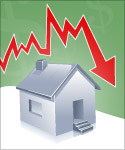The Federal Reserve, the central bank of the United States, is facing a dilemma. With inflation on the rise, they've been aggressively raising interest rates to cool things down. However, this approach is generating criticism, particularly regarding its impact on the housing market.
In an attempt to curb inflation, the Fed announced that it's holding interest rates steady following its June 11-12 meeting, leaving the federal funds rate at a target range of 5.25 to 5.5 percent. This decision comes after the central bank raised rates a total of 11 times during this economic cycle. While they've paused rate hikes for now, inflation remains a major concern. It hit 3.3 percent year-over-year in May, after reaching the highest levels in decades at over 9 percent in mid-2022. The last time the Fed raised rates was at its July 2023 meeting.
Jerome Powell, the Fed Chair, has been defending the way the government calculates housing costs when measuring inflation. However, a recent opinion piece in the Washington Post throws a wrench into his plans. Authored by Jim Parrott, a former White House advisor, and Mark Zandi, Chief Economist at Moody's Analytics, the piece argues that the Fed's current strategy might be based on a flawed understanding of inflation.
While the Fed's rate hikes have shown some success in taming inflation, Parrott and Zandi believe keeping them high for too long could unnecessarily damage the economy. Their primary concern lies with the way housing inflation is measured. They argue that the “owner's equivalent rent” metric is deeply misleading.
Here's the crux of their argument: this metric assumes that housing costs rise in line with rents. However, many Americans either own their homes outright or have fixed-rate mortgages secured at lower interest rates. So, for a significant portion of the population, their monthly housing expenses haven't budged, even though inflation data suggests otherwise.
“If the Fed followed the lead of other developed nations and excluded this measure,” they argue, “inflation would actually be right around their target of 2% – and has been since last fall!”
But the issue goes beyond a faulty metric, according to Parrott and Zandi. They believe high interest rates are actually exacerbating the problem. These rates make it harder to finance new construction, which is desperately needed to address housing shortages. Additionally, higher mortgage rates discourage existing homeowners from selling, reducing the number of homes available – a phenomenon they call the “lock-in effect.”
The result? Parrott and Zandi believe the Fed is fighting a ghost – a phantom inflation fueled by a flawed housing cost metric. At the same time, their policies are creating a real problem – a surge in actual home prices.
Their recommendation? The Fed should call off the inflation war and cut interest rates.
This situation has far-reaching consequences. Whether you're a homeowner, renter, or someone looking to buy, the Fed's decision will significantly impact your financial situation. It's important to stay informed about the latest developments and how they might affect your ability to afford housing.
Beyond the immediate concerns, there are also broader implications to consider. If the Fed misjudges the situation and cuts rates too soon, inflation could roar back. On the other hand, if they keep rates high for too long, it could trigger a housing market meltdown, impacting the overall economy. The Fed needs to tread carefully and navigate this complex situation with a keen eye on both inflation and the health of the housing market.
ALSO READ:
- Predictions: Can Porting Your Mortgage Get You a Lower Interest Rate?
- Mortgage Rate Predictions: Can Assumable Mortgages Offer Hope in 2024?
- High Interest Rates Predicted But is Zero Down Payment Possible?
- Interest Rate Predictions for Next 2 Years: Expert Forecast
- Interest Rates Predictions for 5 Years: Where Are Rates Headed?
- When is the Next Fed Meeting on Interest Rates in 2024?
- Mortgage Rate Predictions for Next 5 Years
- Mortgage Rate Predictions for the Next 2 Years
- Mortgage Rate Predictions for Next 3 Years: Double Digit Rise



